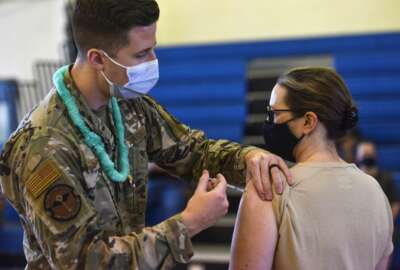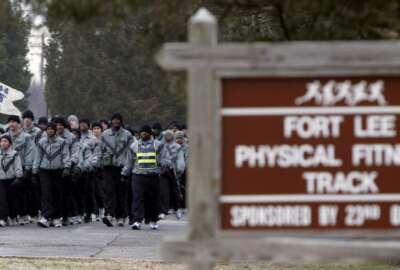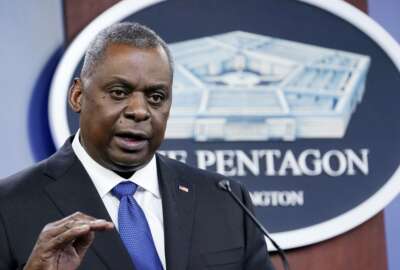DoD will seek to require COVID-19 vaccine for all troops by mid-September at the latest
Pentagon Spokesman John Kirby says DoD may move the timeline closer if COVID rates continue to spike.
The Defense Department is taking actions to make COVID-19 vaccines mandatory for service members by mid-September, or once the vaccines gets licensure from the Food and Drug Administration, whichever comes first.
In a letter to the force, Defense Secretary Lloyd Austin said he made the decision after consulting closely with the chairman of the Joint Chiefs of Staff, the secretaries of the military departments, the military service chiefs and medical professionals.
The move would effectively get a waiver from the White House to make the emergency-use authorization vaccine mandatory. However, if the vaccine gets full approval before then, it will simply become one of the many vaccines service members are required to have to serve in the military.
“The intervening few weeks will be spent preparing for this transition,” Austin wrote in the Aug. 9 memo. “I have every confidence that service leadership and your commanders will implement this new vaccination program with professionalism, skill and compassion. We will have more to say about this as implementation plans are fully developed.”
Pentagon spokesman John Kirby said the military services will be in charge of their own implementation plans based on deployments and current vaccination rates.
Kirby said DoD is working on a policy directive that will go out to service members as a lawful order.
“Adding a vaccine to the mandatory list isn’t something that happens every day,” Kirby said. “It’s a big muscle movement and the secretary wants to give the services ample time to prepare for that, as well as the force.”
Kirby said that DoD is closely monitoring the COVID-19 situation, and will move faster on getting approval for mandatory vaccines if needed. COVID cases are rapidly rising in the United States, paralleling rates from last fall. The seven-day average of new cases is currently at about 110,000.
President Joe Biden quickly responded to Austin’s message, stating he strongly supports the move to make vaccines mandatory.
“Secretary Austin and I share an unshakable commitment to making sure our troops have every tool they need to do their jobs as safely as possible,” Biden wrote. “These vaccines will save lives. Period. They are safe. They are effective. Over 350 million shots have been given in the United States alone. Being vaccinated will enable our service members to stay healthy, to better protect their families, and to ensure that our force is ready to operate anywhere in the world.”
Chairman of the Joint Chiefs of Staff Gen. Mark Milley also released a statement to the force.
“Mandating vaccines in the military is not new. Since the first days of basic training and throughout our service, we’ve received multiple vaccines. We have proven processes with trusted and skilled medical professionals,” he wrote. “If you have taken the vaccine, thank you. If you have not yet taken the vaccine, please do so to protect yourself and those around you. If you have questions about this vaccine, its side effects or implications, consult with your leaders and medical providers.”
Lawmakers are also commending Austin’s decision.
“As the pandemic continues to ravage our communities, and with the rising threat of the delta variant, it is imperative that our service members are protected from this deadly, invisible threat,” Rep. Adam Smith, chairman of the House Armed Services Committee, wrote. “The science is clear: vaccination is the only way to beat this virus. As such, Secretary Austin’s decision to make COVID-19 vaccination mandatory for our entire force is going to save lives and safeguard our military readiness.”
Eileen Huck, deputy director for health care at the National Military Family Association, said she was glad to see Austin’s memo.
“Austin is taking this step to safeguard the health and well-being of service members and their families,” she said. “As family advocates, we’ve been especially concerned about the risk to children and other vulnerable military family members who are not yet eligible to receive the vaccine. Increasing the number of people who are vaccinated is the best way to keep everyone safe.”
There has been some reluctance in the military community to voluntarily get the vaccine. Military advocacy groups that have been conducting surveys found that service members and their families didn’t trust the vaccine creation process or had concerns about its safety.
In February, DoD told Congress that a third of military service members refused to get the vaccine.
About 62% of the force is currently vaccinated, according to Kirby.
There has been no evidence that the vaccine is unsafe for the general population.
Copyright © 2025 Federal News Network. All rights reserved. This website is not intended for users located within the European Economic Area.
Scott Maucione is a defense reporter for Federal News Network and reports on human capital, workforce and the Defense Department at-large.
Follow @smaucioneWFED







